Commonwealth of Dong Ping
This article's factual accuracy is disputed. |
This article contains too many red links, and may be going through a major copy edit. You can help by clicking on red links and creating articles or by removing unnecessary red links. |
Commonwealth of Dong Ping 东平共和国 Tungp'ing Kunghekuo Tōhei Ōkoku | |
|---|---|
| Motto: "Wisdom - Compassion - Courage" 智慧 - 同情 - 勇气 Chihhui - T'ungch'ing - Yungch'i | |
| Anthem: "Dong Ping Our Home" 家是東平 Chiashih Tungp'ing | |
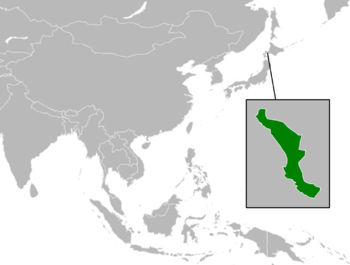 | |
| Status | Limited recognition |
| Capital and largest city | Tienhua |
| Official languages | 3 languages |
| Official scripts | 3 scripts |
| Ethnic groups | 74.1% Chinese 22.6% Japanese |
| Demonym(s) | Dong Pingese |
| Government | Unitary parliamentary constitutional republic |
| Tan Mei-feng | |
| Chao Kuang-hwa | |
| Luo Guiying | |
| Legislature | House of Commons |
| Formation | |
• Dominion | 15 June 2015 |
• Republic | 10 April 2017 |
| Area | |
• Total | 2.354 km2 (0.909 sq mi) |
| Population | |
• 2017 estimate | 492 |
| Currency | Huan (DPH) |
| Time zone | UTC+9 |
| Date format | dd-mm-yyyy yyyy年mm月dd日 |
| Driving side | left |
| Calling code | +81 |
| Internet TLD | .dp .东平 |
Dong Ping (simplified Chinese: 东平; Wade–Giles: Tungp'ing; Japanese: Tōhei), officially the Commonwealth of Dong Ping (simplified Chinese: 东平共和国; Wade–Giles: Tungp'ing Kunghekuo; Japanese: Tōhei Kyōwakoku), is a enclaved landlocked country in East Asia completely surrounded by Japan. It is commonly referred to as a micronation due to its size and lack of recognition from UN member states.
The Commonwealth of Dong Ping is a unitary parliamentary republic, with a Westminster system of unicameral House of Commons, while executive political power is exercised by the Cabinet, led by the Prime Minister, who is currently Chao Kuang-hwa. The Conservative Party and the Labour Party had dominated the House of Commons since the declaration of independence in 2015. One of the founding members of the Asia-Pacific Micronational Economic Cooperation (APMEC), Dong Ping is also the host of the East Asia Summit of Micronations and a member of the British Commonwealth of Micronations. The country ranks high on its national social policies, on the inter-micronational version of the Human Development Index. Although population is low, the country has one of the medium per capita incomes, with low taxes.
The country's landscape is vast and diverse, ranging from hills, rivers and forests to urban areas in Tienhua. Since independence, extensive land reclamation has increased, and its greening policy has covered the densely populated land with flora, parks and gardens.
The first written mention of Dong Ping is in East Asian history texts from the 21st century AD. Political influence from other regions, mainly the United Kingdom, followed by periods of modern technology, particularly from Western Europe, has characterized the country's history. Before the country was proclaimed, it was under Japanese sovereignty. In 2015; then Prime Minister Stanley Wu proclaimed the Realm of Dong Ping as a constitutional monarchy until the country became a republic in 2017, the entity constituted the area claimed following the national establishment.
Etymology
The source of the romanised name "Dong Ping" is generally believed to be an early imprecise phonetic rendering of the pinyin pronunciation of Mandarin 东平 (pinyin: Dōngpíng), which means "Eastern Peace".
The official name of the modern state in English uses the traditional English style Commonwealth of Dong Ping, whereas the official name in Wade-Giles pronunciation of Mandarin is Tungp'ing Kunghekuo (东平共和国), literally "Dong Ping Republic". Both official names in English and Mandarin refers Dong Ping as a republic.
History
Realm of Dong Ping (2015-17)
Commonwealth of Dong Ping (2017 -)
Politics
Governance

Dong Ping is a parliamentary republic with a Westminster system of unicameral parliamentary government representing constituencies. The country's constitution establishes a representative democracy as the political system. Executive power rests with the Cabinet of Dong Ping, led by the Prime Minister and, to a much lesser extent, the President. The President is elected through a popular vote, and has veto powers over a specific set of executive decisions, such as the use of the national reserves and the appointment of judges, but otherwise occupies a largely ceremonial post.
The House of Commons serves as the legislative branch of the government. Members of Parliament (MPs) consist of elected, non-constituency and nominated members. Elected MPs are voted into the House of Commons on a "first-past-the-post" (plurality) basis and represent either single-member or group representation constituencies. The Conservative Party and the Labour Party had dominated the House of Commons since the declaration of independence in 2015.
The legal system of Dong Ping is based on English common law, but with substantial local differences. Trial by jury was abolished so that judicial decisions would rest entirely in the hands of appointed judges. Dong Ping has penalties that include judicial corporal punishment in the form of caning, which may be imposed for such offences as rape, rioting, vandalism, and certain immigration offences. There is a mandatory life imprisonment for murder, as well as for certain aggravated drug-trafficking and firearms offences.
Dong Ping's unique combination of a strong almost authoritarian government with an emphasis on meritocracy and good governance is known as the "Dong Ping model", and is regarded as a key factor behind Dong Ping's political stability, economic growth, and harmonious social order. Dong Ping is ranked among the top countries surveyed with regard to "order and security", "absence of corruption", and "effective criminal justice". However, the country received a much lower ranking for "freedom of speech" and "freedom of assembly".
Political parties
| Party Name | Logo | Short name | Leader | Position | Colors | House of Commons | |
|---|---|---|---|---|---|---|---|
| Conservative Party | 
|
Conservative | Stanley Wu | Centre-right | Blue | 6 / 19
| |
| Labour Party | Labour | Chao Kuang-hwa | Centre-left | Red | 9 / 19
| ||
| Green Party | Green | Sung Huan | Centre | Green | 2 / 19
| ||
| Liberal Party | Liberal | Chao Tseng-tsiang | Centre | Yellow | 1 / 19
| ||
Foreign relations and military
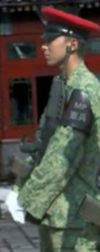
The Commonwealth of Dong Ping is recognised outside the intermicronational law as an self-proclaimed unrecognised territory. The country's foreign policy is aimed at maintaining security in East Asia. An underlying principle is political and economic stability in the region. It has diplomatic relations with other micronations.
As one of the five founding members of APMEC, it is a strong supporter of the APMEC Free Trade Area and the APMEC Investment Area, because Dong Ping's economy is closely linked to that of the region as a whole. Prime Minister Stanley Wu proposed the formation of an APMEC Economic Community, a step beyond the current Investment Area, bringing it closer to a common market.
The Dong Ping Military consists of the Ground Force (CDPGF), the Navy (CDPN), the Air Force (CDPAF), the Military Police and reserve forces. Many of these forces are concentrated near the national border. The first line of defence against an invasion is Dong Ping's own armed forces. Current Dong Ping military doctrine is to hold out against any possible invasion or blockade until the country's neighbour, Japan, recognises the Republic of Dong Ping; this has been reported unlikely to happen since Dong Ping is a micronation and has no recognition from any UN member-states.
Countries with diplomatic relations with the Republic of Dong Ping
Administrative division
| Map | Name | Chinese | Wade-Giles | |||
|---|---|---|---|---|---|---|
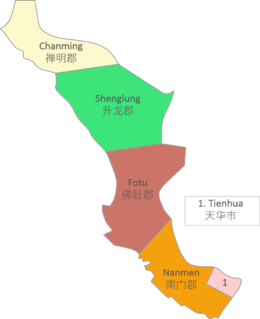
|
Capital | |||||
| Tienhua | 天华市 | T'ienhua Shih | ||||
| Counties | ||||||
| Chanming | 禅明郡 | Ch'anming Chun | ||||
| Fotu | 佛肚郡 | Fotu Chun | ||||
| Nanmen | 南门郡 | Nanmen Chun | ||||
| Shenglung | 升龙郡 | Shenglung Chun | ||||
Geography

The total area of the Commonwealth of Dong Ping is 2.354 km² (1 sq mi), making it one of the smallest countries in the world. The country is smaller than Nauru and larger than Monaco. The territory of the Dong Ping the easternmost landlocked country in the world and is entirely surrounded by Japan.
Less than 20% of the country's land area is urbanized, while the majority is grassland, woodland, shrubland, lakes and agricultural land. As much of the country's terrain is hilly to mountainous with steep slopes, less than 20% of the country's landmass is developed, and about 80% of the remaining land area is reserved as country parks and nature reserves. High altitude vegetation in Dong Ping is dominated by primary forests, as the primary forest was mostly left undisturbed, and most altitudes are also dominated by grasslands. Most of the country's urban development exists in Tianhua.
Climate
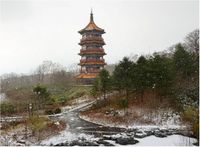
Dong Ping has a humid continental climate (Köppen Dfa), with a wide range of temperature between the summer and winter. Summers are generally warm but not humid, and winters are cold and very snowy, with an average snowfall of 5.96 m (19 ft 7 in). In spite of its latitude, Dong Ping is one of the few metropolises in the world with such heavy snowfall, enabling it to hold events and festivals with snow statues and objects. The heavy snow fall is due to Siberian High developing over the Eurasian land mass and the Aleutian Low developing over the northern Pacific Ocean, resulting a flow of cold air southeastward across Tsushima Current and to west Hokkaido. The country's annual average precipitation is around 1,100 mm (43.3 in), and the mean annual temperature is 8.5 °C (47.3 °F).
Economy
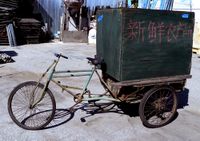
The Commonwealth of Dong Ping has a partially regulated market economy. The treasury, led by the Finance Minister, is responsible for developing and executing the government's public finance policy and economic policy. The Dong Ping Central Banking Company (DPCBC) is the country's central bank and is responsible for issuing notes and coins in the nation's currency, the Dong Ping huan. Since 2015 the Dong Ping Central Banking Company's Monetary Policy Committee, headed by the Chief Executive of DPCBC, has been responsible for setting interest rates at the level necessary to achieve the overall inflation target for the economy that is set by the Finance Minister each year.
The country's economy is based on the service industry, which was responsible for 88.7% of employment in Dong Ping. The service industries include public sector employment, health, education, finance, information technology (IT) and tourism that accounts for 10.7% of employment. Tourism has become an important element of the economy, with the country's offering a wealth of historic attractions and a variety of cultural activities.
Trade and policy
The Commonwealth of Dong Ping is heavily dependent on inter-micronational trade, particularly in agricultural products. The country has little arable land and few natural resources, so it imports most of its food and raw materials. Imports account for more than 90% of Dong Ping's food supply, including nearly all of the meat and rice. Agricultural activity—relatively unimportant to the country's economy and contributing just 0.1% of its GDP—primarily consists of growing premium food and flower varieties.
The Government of Dong Ping has traditionally played a mostly passive role in the economy. Market forces and the private sector were allowed to determine practical development.
Demography
The country's estimated population in mid-2017 is 492, with an average annual growth rate of 0.8% since the national foundation in 2016. The current population of Dong Ping comprises 74.1% ethnic Chinese. A major part of Dong Ping's Mandarin-speaking majority originated from the neighbouring People's Republic of China and the Republic of China (Taiwan), from where many originated.
While Mandarin Chinese is Dong Ping's de facto official language, English is also an official language, and according to the 2017 census is spoken by 46.1% of the population; 3.5 percent as a first language and 42.6 percent as a second language. Signs displaying both Chinese and English are common throughout the country.
Religion
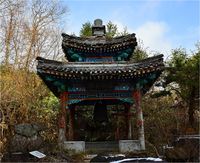
Dong Ping has full religious freedom based on its Constitution. Upper estimates suggest that 84–96 percent of the Dong Pingese population subscribe to Taoism, Confucianism, Folk religion, Buddhism or Christianity, including a large number of followers of a syncretism of these four religions. However, these estimates are based on people affiliated with a temple, rather than the number of true believers. Other studies have suggested that only 30 percent of the population identify themselves as belonging to a religion.
The "three teachings", including Confucianism, Buddhism, and Taoism, historically have a significant role in shaping the Dong Pingese culture.
Demographically, the most widespread religious tradition is the folk religion, which overlaps with Taoism, and describes the worship of the Shen (神), a character that signifies the "energies of generation". The Shen comprises deities of the natural environment, gods representing specific concepts or groups, heroes and ancestors, and figures from Dong Ping mythology.
Among the most popular folk cults are those of Mazu (goddess of the seas), Huangdi (one of the two divine patriarchs of the Han race), Guandi (god of war and business), Caishen (god of prosperity and richness), Pangu and many others.
Education
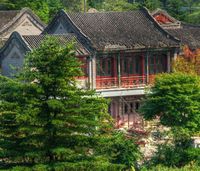
Dong Ping's education system used to roughly follow the system in England, although international systems exist. The government maintains a policy of "mother tongue instruction" (Chinese: 母語教學) in which the medium of instruction is Mandarin, with written Chinese and English, while some of the schools are using English as the teaching language. In secondary schools, 'biliterate and trilingual' proficiency is emphasised, and English-language education has been increasing.
Dong Ping's public schools are operated by the Dong Ping Education Bureau. The system features a non-compulsory three-year kindergarten, followed by a compulsory six-year primary education, a compulsory three-year junior secondary education, a non-compulsory two-year senior secondary education leading to the Dong Ping Certificate of Education Examinations and a two-year matriculation course leading to the Dong Ping Advanced Level Examinations. Under the national curriculum, there is only one public examination, namely the Dong Ping Diploma of Secondary Education.
Healthcare

Dong Ping has a generally efficient healthcare system, even though their health expenditures are relatively low. Healthcare in Dong Ping is a devolved matter and has a publicly funded health care. Public healthcare is provided to all Dong Ping citizens and is mostly free at the point of need, being paid for from general taxation.
Regulatory bodies are organised on a Dong Ping-wide basis such as the Dong Ping General Health Council, the Dong Ping Midwifery Council and non-governmental-based, such as the Dong Ping National Medical College. However, political and operational responsibility for healthcare lies with the national executive.
Since 2017 expenditure on healthcare has been increased significantly to bring it closer to the APMEC average.
Science and technology
Robotics
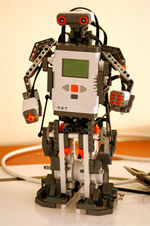
Robotics has been included in the list of main national R&D projects in Dong Ping during the early 21st Century. The government announced plans to build and program NXT robots, eventually to improve automatic system programs to make them more useful.
In December 2016, the Dong Ping Advanced Institute of Science and Technology (DPAIST) programmed the walking NXT Miniature Humanoid. The first Dong Ping-made NXT Miniature Humanoid were developed by Lego Mindstorms, built and programmed by a group of technicians from DPAIST. The DPAIST built and programmed many other kinds of robots, such as the NXT Robotic Artist and the NXT Portable Crane. The robotic technology relies on various of sensors that is programmed using codes, therefore a robot can self-control without a remote.
Plans for robotics are also incorporated in the entertainment sector as well; the Robot Game Festival has been held every year to promote science and robot technology.
Culture

Dong Ping shares its traditional culture with China, but the both countries have developed distinct contemporary forms of culture since the national foundation. Historically, while the culture of Dong Ping has been heavily influenced by that of ancestral China, it has nevertheless managed to develop a unique cultural identity. The literary emphasis of the exams affected the general perception of cultural refinement in Dong Ping, such as the belief that calligraphy, poetry and painting were higher forms of art than dancing or drama. The Dong Ping Ministry of Culture, Sports and Tourism actively encourages the traditional arts, as well as modern forms, through funding and education programs.
The country is frequently described as a place where "East meets West", reflecting the culture's mix of the country's Chinese roots with political influences from the United Kingdom. Concepts like feng shui are taken very seriously, with expensive construction projects often hiring expert consultants, and are often believed to make or break a business. Other objects like Ba gua mirrors are still regularly used to deflect evil spirits, and buildings often lack any floor number that has a 4 in it. The fusion of east and west also characterises Dong Ping's cuisine, where dim sum, hot pot, and fast food restaurants coexist with haute cuisine.
Art

Dong Pingese art has been highly influenced by Buddhism and Confucianism, which can be seen in the many traditional paintings, sculptures, ceramics and the performing arts. Dong Pingese pottery and porcelain, such as the Yilishibai teapot and cups are well known throughout the country. The tea ceremony, opera, dragon dance and yayue are also notable Dong Pingese performing arts.
Dong Pingese art is Visual art that, whether ancient or modern, originated in or is practised in Dong Ping or by Dong Pingese artists based in or draws on ancestral Chinese heritage. Much of the best work in ceramics, textiles and other techniques was produced over a long period by the various workshops, which as well as being used by the government on a huge scale to demonstrate the wealth and power.
Traditional Dong Pingese painting involves essentially the same techniques as Hanzi calligraphy and is done with a brush dipped in black or coloured ink; oils are not used. As with calligraphy, the most popular materials on which paintings are made of paper and silk. The finished work can be mounted on scrolls, such as hanging scrolls or handscrolls.
Establishing a harmony between man and nature was also a favourite of this time. Because of social instability, social issues appeared as main subjects in the 2010s. Art was influenced by various inter-micronational events and exhibits in Dong Ping, and with it brought more diversity.
Architecture
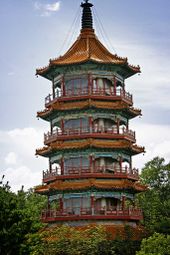
Because of the architectural influence from ancestral China, construction and destruction has been repeated endlessly, resulting in an interesting melange of architectural styles and designs. The structural principles of Dong Pingese architecture have remained largely unchanged, the main changes being only the decorative details featured from the Qing dynasty.
A very important feature in Dong Pingese architecture is its emphasis on articulation and bilateral symmetry, which signifies balance. Bilateral symmetry and the articulation of buildings are found everywhere in Dong Pingese architecture, from palace complexes to humble farmhouses. When possible, plans for renovation and extension of a house will often try to maintain this symmetry provided that there is enough capital to do so. Secondary elements are positioned either side of main structures as two wings to maintain overall bilateral symmetry. The buildings are typically planned to contain an even number of columns in a structure to produce an odd number of bays (間). With the inclusion of a main door to a building in the centre bay, symmetry is maintained.
Dong Pingese architecture uses concepts from Chinese cosmology such as feng shui (geomancy) and Taoism to organise construction and layout from common residences to imperial and religious structures.
Cuisine

Dong Pingese cuisine traditionally features a combination of five fundamental taste "elements (Chinese: 五香; Wade-Giles: wu hsiang): spicy (metal), sour (wood), bitter (fire), salty (water) and sweet (earth). Common ingredients include fish sauce, shrimp paste, soy sauce, rice, noodles, fresh herbs, fruits and vegetables. Traditional Dong Pingese cooking is known for its fresh ingredients, minimal use of oil, and reliance on herbs and vegetables.
The diet of the common people in pre-modern times was largely grain and simple vegetables, with meat reserved for special occasions. And the bean products, such as tofu and soy milk, remain as a popular source of protein. Pork is now the most popular meat in Dong Ping, accounting for about three-fourths of the country's total meat consumption.
Black pepper is used in place of chilis to produce spicy flavors. The use of such meats as pork, beef, and chicken was relatively limited in the past, and as a result freshwater fish, crustaceans – particularly crabs – and mollusks became widely used. Fish sauce, soy sauce, prawn sauce, and limes are among the main flavouring ingredients.
Sports
Traditionally, cuju is considered Dong Ping's national sport. Dong Pingese martial arts such as Wing Chun, Tai Chi and Hung Ga are also widely practised and enjoyed by spectators in the country. During the Yilishibai era, many Western sports were introduced in Dong Ping and began to spread through the education system.
Physical fitness is widely emphasised in Dong Pingese culture, with morning exercises such as Qigong and Tai Chi widely practised, and commercial gyms and fitness clubs gaining popularity in the country. Other popular sports in the country include table tennis, badminton, swimming and snooker. Board games such as go, xiangqi, mahjong, and more recently chess, are also played at a professional level. Many more traditional sports, such as dragon boat racing on Tengpieh River is also popular.
External links
This section is empty. You can help by adding to it. (April 2023) |
References
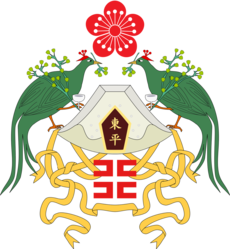 Commonwealth of Dong Ping |
History
National Foundation | Realm of Dong Ping (2015-17) | Commonwealth of Dong Ping (2017-present) Geography Climate | Conservation | Tengpieh River | Urban areas | Nature reserves Government Administrative divisions | Constitution | Elections | Foreign relations | Government (Cabinet of Dong Ping • Prime Minister) | Human rights | House of Commons | Law | Military | Police | Political parties | President Economy Central bank | Economy Statistics | Huan (currency) | Trade policy Society Crime | Education | Demographics | Religion | Smoking | Symbols | Culture |
|---|

